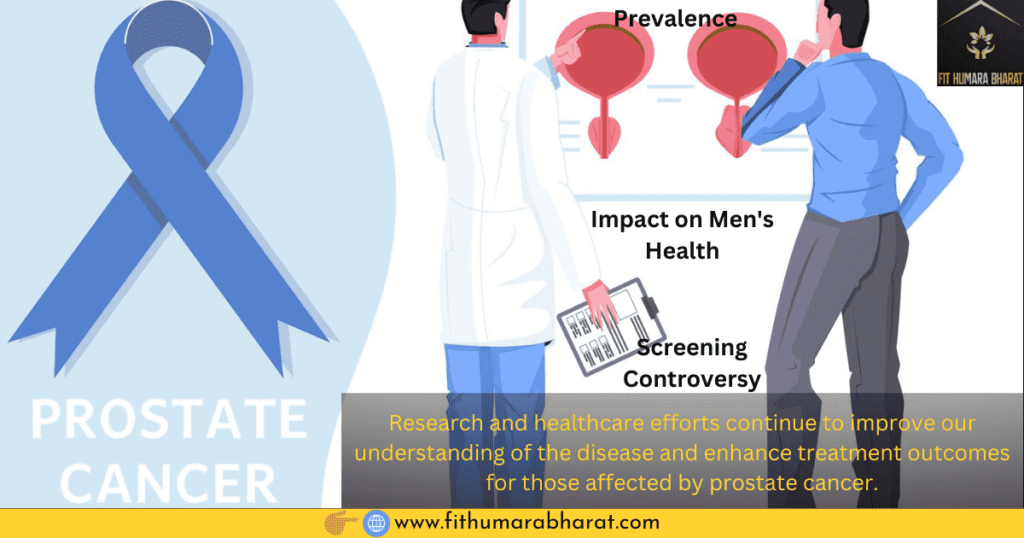Prostate cancer stands as one of the most common forms of cancer affecting men, especially those in older age groups. While conventional medical interventions such as surgery, radiation therapy, and chemotherapy are widely employed to combat this condition. Ayurveda and naturopathy offer alternative methodologies aimed at addressing underlying causes, relieving symptoms, and enhancing overall well-being.

Grasping Prostate Cancer – Unpacking the Prostate Gland
The prostate gland, a small, walnut-sized organ located just below the bladder in men, plays a vital role in the male reproductive system. Despite its role in reproduction, the prostate is susceptible to cancer.
Tracing Causes and Risk Factors
The exact etiology of prostate cancer remains elusive, but several risk factors have been identified:
| Age | The risk of prostate cancer escalates significantly with advancing age, particularly after reaching the age of 50. |
| Family History | A familial history of prostate cancer can heighten one’s susceptibility, with genetics potentially playing a role in some instances |
| Race and Ethnicity | African-American men face a greater risk of prostate cancer compared to other racial groups. |
| Dietary Patterns | Diets abundant in red meat and lacking in fruits and vegetables may contribute to an elevated risk. |
| Obesity | Research suggests that obesity is associated with an increased likelihood of aggressive prostate cancer |
| Hormonal Fluctuations | Variations in hormonal levels, especially elevated testosterone levels, may contribute to prostate cancer development |
| Environmental Influences | Exposure to certain environmental toxins and chemicals may also correlate with an augmented risk. |
| Lifestyle Choices | Leading a sedentary lifestyle and smoking have been identified as potential factors linked to prostate cancer. |
Signaling Symptoms of Prostate Cancer
Prostate cancer often progresses at a slow pace, and in its early stages, it might not manifest any discernible symptoms. However, as the disease advances, several indicators may emerge:
Urinary Disturbances:
These may entail increased urination frequency, difficulty commencing and maintaining a consistent urine stream, and pain or discomfort during urination.
Hematuria or Hematospermia:
The presence of blood in the urine or semen can serve as a concerning sign that warrants immediate evaluation.
Erectile Dysfunction:
Challenges in achieving or sustaining an erection may occur as prostate cancer advances.
Pelvic Discomfort:
Discomfort or pain experienced in the pelvic region, lower back, or upper thighs may signify advanced prostate cancer that has infiltrated nearby tissues.
Skeletal Discomfort:
In advanced stages, prostate cancer can metastasize to the bones, resulting in skeletal pain, fractures, and diminished range of motion.
Unexplained Weight Loss:
Unintended weight loss and persistent fatigue can be associated with advanced prostate cancer.
It is imperative to acknowledge that these symptoms can also be attributed to non-cancerous conditions like benign prostatic hyperplasia (BPH) or urinary tract infections. Consequently, individuals experiencing any of these symptoms should promptly consult a healthcare professional for a precise diagnosis.
Ayurvedic Approach to Prostate Cancer
Ayurveda, an ancient system of medicine originating from India, offers a holistic approach to health and healing. Within Ayurvedic philosophy, cancer is perceived as an expression of imbalances within the body’s doshas (Vata, Pitta, and Kapha), culminating in the accumulation of toxins and the disruption of natural bodily functions. Ayurvedic treatment for prostate cancer typically abides by the following principles:
| 1 | Dietary Adjustments | Ayurveda advocates for dietary regimens tailored to an individual’s constitution (Prakriti) and prevailing imbalances (Vikriti). These adjustments may encompass the inclusion of anti-cancer foods like turmeric, green tea, and cruciferous vegetables, alongside the avoidance of processed foods, excessive sugars, and red meat |
| 2 | Herbal Remedies | Ayurvedic practitioners may proffer specific herbal formulations, personalized to a patient’s constitution and the nature of their cancer. Herbs such as Ashwagandha, Tulsi, and Turmeric are frequently employed for their potential anti-cancer properties. |
| 3 | Detoxification | Panchakarma, an Ayurvedic purification and detoxification therapy, may be recommended to eliminate accumulated toxins and reinstate balance. |
| 4 | Lifestyle Modifications | Ayurveda promotes a balanced lifestyle inclusive of stress management techniques such as yoga and meditation. These practices are believed to aid in reinstating harmony within the body and mind. |
| 5 | Agni Restoration | Ayurveda places great emphasis on preserving proper digestion (agni). Herbal concoctions and dietary modifications may be prescribed to augment digestive function. |
It is imperative to underscore that Ayurvedic treatments should be administered under the supervision of a qualified Ayurvedic practitioner capable of tailoring the approach to the individual’s specific requirements.
Naturopathic Approaches to Prostate Cancer
Naturopathic medicine, a holistic healthcare approach, aims to identify and address the root causes of illness while nurturing the body’s intrinsic capacity to self-heal. Naturopathic treatments for prostate cancer often encompass the following components:
| 1 | Nutrition and Diet | Naturopathic physicians concentrate on optimizing nutrition by recommending diets rich in anti-inflammatory foods like fruits, vegetables, whole grains, and lean proteins. Specific nutrients such as lycopene and selenium may be highlighted. |
| 2 | Supplements | Naturopathic practitioners may suggest supplements like vitamin D, fish oil, or herbal extracts, which potentially possess anti-cancer properties. |
| 3 | Physical Activity | Exercise and physical activity play pivotal roles in naturopathic care. Regular exercise can enhance overall health, boost immune function, and reduce inflammation. |
| 4 | Stress Management | Naturopathic medicine recognizes the substantial influence of stress on health and encourages stress management techniques, including mindfulness meditation, deep breathing exercises, and yoga. |
| 5 | Detoxification | Naturopathic doctors might employ detoxification protocols to support the body’s inherent processes of toxin elimination. |
| 6 | Botanical Medicine | Herbal remedies, meticulously chosen according to an individual’s condition, may be recommended to alleviate prostate cancer symptoms and support the body’s healing mechanisms. |
| 7 | Lifestyle Modifications | Naturopathic medicine underscores lifestyle shifts. It is including smoking cessation and the restriction of alcohol consumption, as these factors can impact cancer risk. |
Prostate cancer necessitates a multifaceted approach to treatment and care. Conventional medical treatments have made significant strides in managing prostate cancer. But, complementary therapies like Ayurveda and naturopathy provide additional avenues of support.
Conclusion
Individuals contemplating these alternative approaches should do so in consultation with qualified healthcare professionals . It can provide guidance through the intricacies of each medical system. An integrative approach, uniting the strengths of various healthcare paradigms. It may offer a more holistic and personalized route to managing prostate cancer while catering to the unique requirements and preferences of each individual. Ultimately, the objective is to optimize both the treatment outcomes and the overall well-being of prostate cancer patients.
Thank you 🙏
- Prostate Cancer Disparity, Chemoprevention, and Treatment by Specific Medicinal Plants
- Phytochemicals in Prostate Cancer: From Bioactive Molecules to Upcoming Therapeutic Agents
- Various treatment options for benign prostatic hyperplasia: A current update
- Use of complementary and alternative medicine among patients with cancer in a sub-Himalayan state in India: An exploratory study
- Herbs and Spices in Cancer Prevention and Treatment

